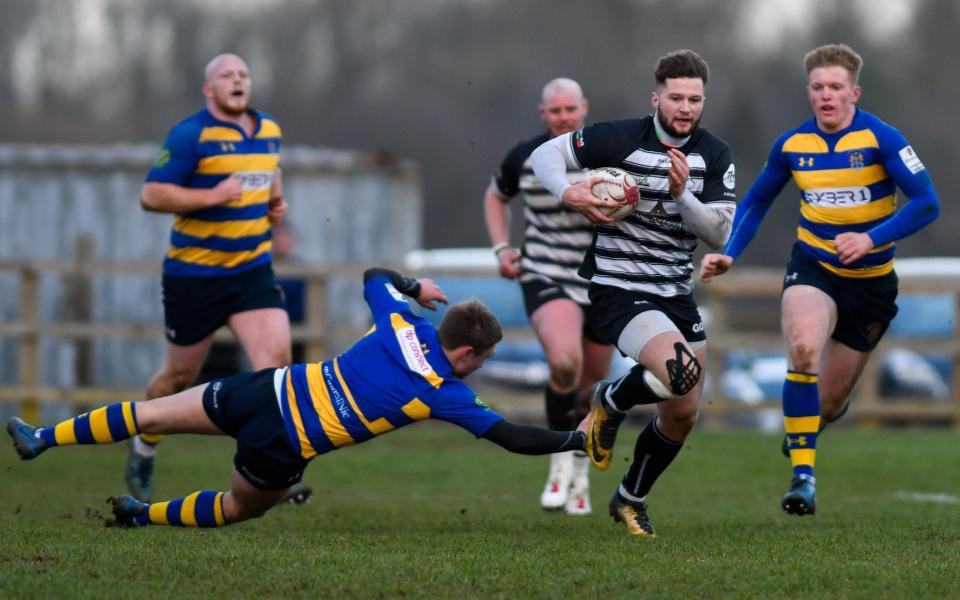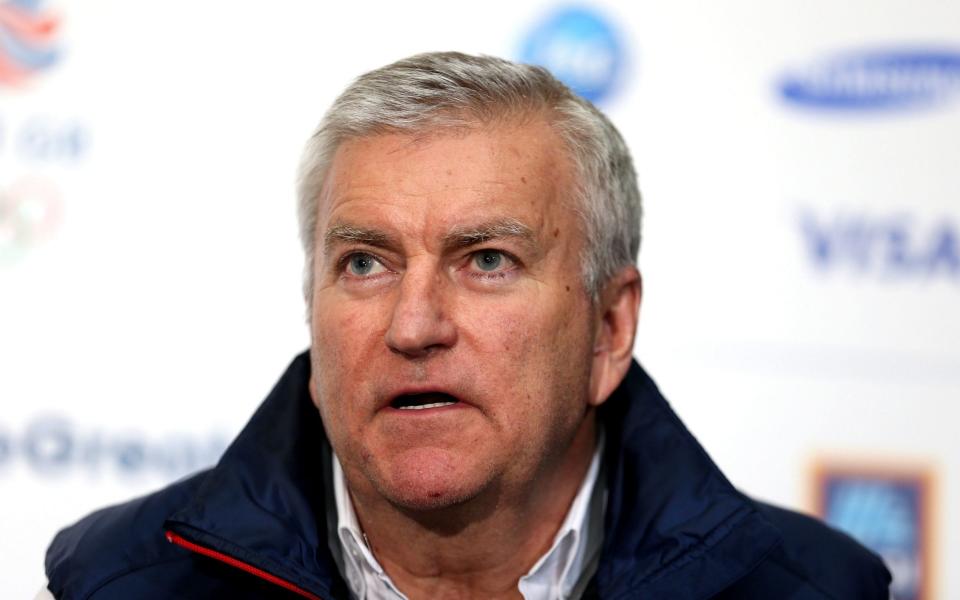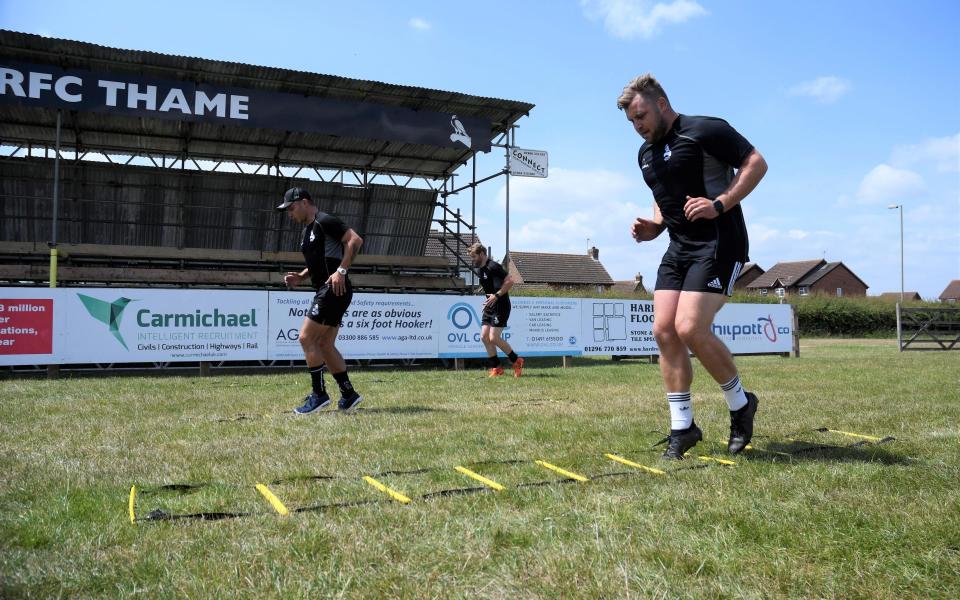How Chinnor are 'rewriting the playbook' for semi-professional rugby in post-pandemic England

Upon taking over as director of rugby at Chinnor RFC two months ago, Richard Thorpe was given licence to “rewrite the playbook” and restructure the entire club.
As the former London Irish and Canada flanker acknowledges, English rugby union’s second and third tiers have seemed like “the Wild West” over recent years – not that the Premiership has exactly represented a bastion of financial responsibility.
After the 2019-20 league table was rearranged to account for fixtures that fell victim to Covid-19, Chinnor ended up fourth in National One. Only Richmond, promoted to the Championship again, Rams and Rosslyn Park were above the Oxfordshire outfit.
National One, with its salary cap of £250,000, is a demanding competition in which players can earn decent money. But the pandemic has encouraged Thorpe to provide more for his charges.
“I think of myself as a player-centred DOR,” explains the Beckenham-born 35 year-old, who has worked in London as a performance coach for business executives and for athletes transitioning into full-time jobs.

“I asked myself: ‘What do players really need?’ Globally, there is massive uncertainty. If you’re a semi-professional rugby player, with that uncertainty comes anxiety about what your future might look like.
“Our players train on Tuesday and Thursday evenings and play on the weekends. They have scope for a full-time job, so most of them have one.”
As if a sense of uncertainty needed reinforcing, National One teams are preparing for three possible start windows for the 2020-21 campaign with October 3, November 28 and January 30 the cut-off dates.
Using the experience of two club volunteers, Sam Angell and human resources specialist Emma Canter, Thorpe has launched a careers hub. The aim is to sharpen CVs, engage local businesses and target opportunities for players, many of whom are thriving in careers away from rugby as it is. Others need more of a nudge.
“It’s easy to arrange a stop-gap, getting them on a building site moving bricks,” Thorpe says. “I want to get players asking the question: ‘What do I still want to be doing in 30 years? Can I establish a career in something?’
“I want them to realise that they don’t have to be earning huge money on day one as long as they have a perspective that helps them feel as though they are moving forward in their lives.
“Players who are well-grounded and moving forward with their lives with excitement can walk into the club with a smile on their face and a spring in their step.”

Rugby Football Union chief executive Bill Sweeney has openly criticised the scale of player payments further down the pyramid and cutting funding to the Championship was a flagship move of his tenure even before the fiscal fall-out of Covid-19 opened its jaws.
Ringfencing the Premiership seems increasingly inevitable, with even ambitious Championship figures such as Coventry chairman Jon Sharp conceding as much. When Thorpe describes the general profile of those who need the most guidance to settle on a non-rugby career path, he outlines a shifting picture.
“Here’s the thing – it’s all changed,” he adds. “We’re in a completely different landscape to one that we were in 12-24 months ago when a player in National One could see a path through to the Premiership. That door may be closing.
“If they lop off the Premiership, I think most of the Championship clubs that survive would probably move part-time. Is it realistic for a player that hasn’t come through a Premiership academy to play in the Premiership? I think it will be very bold, if not impossible.
“For [National League] players that would usually push towards a full-time job in the Championship, that pathway is starting to wobble. Some of them, if they are in their early 20s, might not have thought they would need to put their attention towards a career for the next five or six years. It’s about fast-forwarding their requirement to go and seek non-rugby work.

“We have all shapes and sizes. Some have come from universities, some have come from Premiership academies, others have been churning away in the National Leagues and in the Championship. So, this has to be a subjective approach.
“I can’t stand in a room and say: ‘You’re all working for X company in Y job’. What we do will be case-by-case. We will explore, on a one-to-one basis, what they want to do long-term. And if it is going to be sustainable, they need to want to do it.”
Coventry are a good example of a club that has engaged the increasing number of top-flight players squeezed out of jobs. The Rugby Players’ Association, whose Gain Line programme is showing tangible benefits for such individuals, is aware that there are approximately 50 players who either have no contract or do not currently have long-term options beyond the next few months.
In that respect, Chinnor want to provide an attractive service for those at both ends of the spectrum. As well as teenagers who may find it difficult to bridge the gap to the elite ranks after missing the cut for a Premiership academy, they are keen to remain a desirable destination for more experienced operators.
“Premiership players with head-room in their careers are now genuinely exploring other options. They’d be able to earn very good money in National One for their rugby and may see an opportunity with a club like us – who are putting resource into career- and life-development – to carry on playing at a high standard, and it is a high standard, and keep an eye on the future.”

Thorpe is keen to add that Chinnor will remain “very competitive” spenders. Ofisa Treviranus, the excellent ex-Samoa international and a London Irish legend, played for them last season. That said, chairman Simon Vickers has proposed halving the salary cap to £125,000. John Inverdale, the recently-appointed chairman of the National Clubs Association, stressed the potential impact of funnelling funds towards improved facilities in a recent interview with The Rugby Paper.
“How does a community rugby club generate income? It sells tickets to games, sells drinks behind the bar and sells sponsorship packages,” Thorpe continues. “No community rugby club is getting any of that at the moment. Yes, there are clubs with a wealthy backer but most of them are navigating their businesses through Covid-19.
“In terms of what we’ll be spending, we will be well within the salary cap and will hopefully be able to mitigate any decrease in what we pay players by helping them establish careers that they may not otherwise be able to.”
“Look, is the way to get the best out of a player to throw as much money at them as possible?” Thorpe adds. “In my experience, it’s not the most efficient way of building a successful team. The best way of getting the best out of anyone, in any industry, is to create buy-in and give them ownership of what they do in an environment they want to be part of. You could make someone the highest-paid player in the league but they could still feel miserable walking into training.
“Rugby players have needs that extend beyond getting paid as much as they can. I don’t want them to rely on them being an outstanding player so they are paid up until they retire at 35 because they are going to need more than that.
“I’m interested in how they develop while they are playing to ensure that they flourish as much in the next stage of their lives. We’re going to focus on that, but not at the expense of paying players. If we get it right, it’ll be win-win across the board.”

An RFU review group into the payment of players in the community game, which goes on fairly prevalently as low as level eight, has been set up under Malcolm Wharton, a former principal of Hartpury College and a sports consultant. The findings, and how any recommendations are implemeted, will be fascinating.
Whatever they are, Thorpe seems confident that Chinnor’s proactive off-field initiative will put them in a strong position.
“If you are a National One club, and you pay a player the equivalent of a full salary to train two evenings a week and play on the weekends, are you incentivising that player to do something outside of the club?
“I see danger with highly-paid, part-time club players. It could incentivise them not to take action in other areas of their life. Even if money will attract some of the best talent, I think that, in three to five years, the most successful clubs will be those who can offer more than that.”

 Yahoo News
Yahoo News 